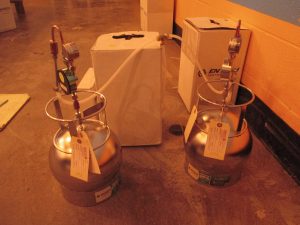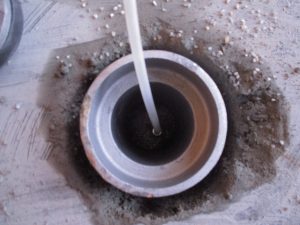Considering Soil Vapor Intrusion When Purchasing a Commercial Property
Virgin land has become a rare find for developers and business owners. Often, the land in this region has been previously developed one or more times, and its history may not be fully understood. If a property has been utilized for commercial or industrial purposes that involved the storage or use of petroleum or chemicals (such as gas stations, former car dealerships, autobody shops, dry cleaners), a Soil Vapor Intrusion (SVI) condition may exist within the existing structure, and it may impact the health of your employees and the profits of your business!
What is SVI and Why is it a Problem?
SVI conditions may occur when chemicals or petroleum products (such as dry-cleaning chemicals, gasoline, diesel fuel, motor oil) spill or leak. Once the contamination enters the ground, vapors are generated and can occupy the air spaces between soil particles. The vapors can migrate (sometimes from off-site locations), and become trapped beneath building slabs. The vapors can then push upwards through foundation cracks penetrations and seams, and enter into buildings. If vapor intrusion continues unchecked, the vapors may impact the health of building occupants. According to the United States Environmental Protection Agency, eye and respiratory irritation, headaches and/or nausea may occur. If exposure continues over the course of many years, the risk of chronic diseases or cancer may increase.
How to Know if You Have SVI Issues at Your Site:
If you are purchasing a property that has a history of commercial or industrial use, it is prudent to have an investigation performed to understand any potential impacts and protect yourself from environmental concerns that are associated with the Site, or neighboring sites.
The first step is a Phase I Environmental Site Assessment, especially if the full history of the Site is unknown. A Phase I can tell you if there have been any reported chemical or petroleum spills or releases at your Site or a neighboring site that would make SVI a concern.
If the Phase I indicates a potential issue, or if the history of the Site is known and SVI is a concern, a soil vapor intrusion investigation can be performed by collecting air samples from beneath the building slab along with indoor and outdoor ambient air. The air samples are analyzed at a lab, and the data will indicate if there is a SVI condition at the property.
How Do I Address SVI?
Various engineering controls can provide solutions for SVI issues. Most often, a Sub Slab Depressurization System (SSDS) or a Soil Vapor Extraction (SVE) system is installed within the building. A SSDS creates a negative pressure field beneath the slab with a vacuum, pulls the air out from beneath the building, and vents it into the atmosphere. While SSDS provide protection from vapors trapped beneath the system, SVE systems provide a more active remediation of contaminated soil vapor through well points. SSD and SVE systems are Site specific, and vary in design and complexity based on factors such as geology and building foundations. In order to design the most effective system, a pilot test is performed prior to its design and installation.
SVI is an increasing concern to governmental agencies. In order to protect your business and employees from SVI, due diligence is a must. Walden Environmental Engineering has a team of engineers and scientists with thorough experience in soil vapor investigations and remedial system designs. To learn more about how we can help you with your next project, give us a call at (516)-624-7200!



